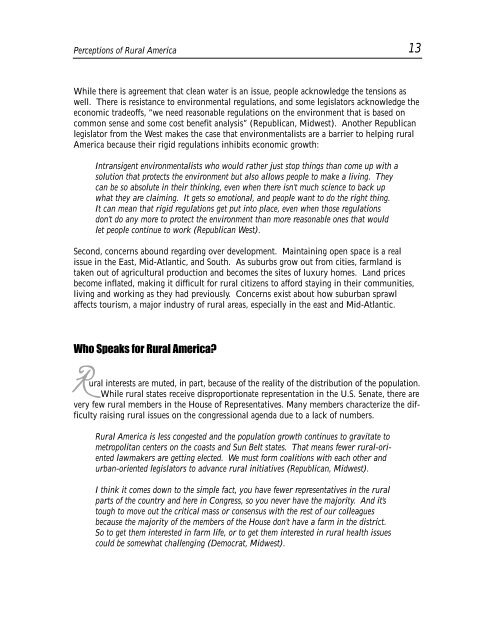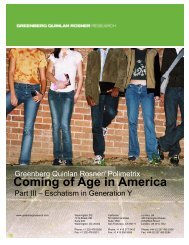803_Congressional Perspectives.pdf - Greenberg Quinlan Rosner
803_Congressional Perspectives.pdf - Greenberg Quinlan Rosner
803_Congressional Perspectives.pdf - Greenberg Quinlan Rosner
- No tags were found...
You also want an ePaper? Increase the reach of your titles
YUMPU automatically turns print PDFs into web optimized ePapers that Google loves.
Perceptions of Rural America13While there is agreement that clean water is an issue, people acknowledge the tensions aswell. There is resistance to environmental regulations, and some legislators acknowledge theeconomic tradeoffs, “we need reasonable regulations on the environment that is based oncommon sense and some cost benefit analysis” (Republican, Midwest). Another Republicanlegislator from the West makes the case that environmentalists are a barrier to helping ruralAmerica because their rigid regulations inhibits economic growth:Intransigent environmentalists who would rather just stop things than come up with asolution that protects the environment but also allows people to make a living. Theycan be so absolute in their thinking, even when there isn’t much science to back upwhat they are claiming. It gets so emotional, and people want to do the right thing.It can mean that rigid regulations get put into place, even when those regulationsdon’t do any more to protect the environment than more reasonable ones that wouldlet people continue to work (Republican West).Second, concerns abound regarding over development. Maintaining open space is a realissue in the East, Mid-Atlantic, and South. As suburbs grow out from cities, farmland istaken out of agricultural production and becomes the sites of luxury homes. Land pricesbecome inflated, making it difficult for rural citizens to afford staying in their communities,living and working as they had previously. Concerns exist about how suburban sprawlaffects tourism, a major industry of rural areas, especially in the east and Mid-Atlantic.Who Speaks for Rural America?Rural interests are muted, in part, because of the reality of the distribution of the population.While rural states receive disproportionate representation in the U.S. Senate, there arevery few rural members in the House of Representatives. Many members characterize the difficultyraising rural issues on the congressional agenda due to a lack of numbers.Rural America is less congested and the population growth continues to gravitate tometropolitan centers on the coasts and Sun Belt states. That means fewer rural-orientedlawmakers are getting elected. We must form coalitions with each other andurban-oriented legislators to advance rural initiatives (Republican, Midwest).I think it comes down to the simple fact, you have fewer representatives in the ruralparts of the country and here in Congress, so you never have the majority. And it’stough to move out the critical mass or consensus with the rest of our colleaguesbecause the majority of the members of the House don’t have a farm in the district.So to get them interested in farm life, or to get them interested in rural health issuescould be somewhat challenging (Democrat, Midwest).




